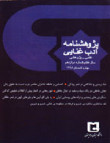The Khayyam-like protest and uprising in the poems of Mahdi Akhavan-e Sales
Author(s):
Article Type:
Research/Original Article (دارای رتبه معتبر)
Abstract:
Introduction
The reflections of Khayyam on the philosophy of life and death, sometimes accompanied by doubts, questions and objections, is considered as one of the unceasing concerns of mankind throughout history. Khayyam's art is to portray these philosophical reflections in a subtle and poetic manner in the form of Rubái (quatrain). Khayyam's special thoughts and views about life and death, along with his expression manner and particular images, have had a great deal of echo in Persian literature from the past to the present time. Mehdi Akhavan-e Sales is among the poets whose works are clearly affected by the thoughts of Khayyam. A look at the life of this contemporary poet shows such a fondness for the poems of Khayyam that it is stated "The dearest figure for him, in the Islamic period of Persian history, was Khayyam" (Shafii Kadkani, 1386, p. 397). The purpose of this study is to investigate Khayyam-like protest and uprising in the poetry of Akhavan-e Sales with regard to various socio-political and philosophical fields. The main question in this study is that to what extent the Khayyam-like protest and uprising observed in the poetry of Akhavan-e Sales is based on the socio-political aspects of his era, and how the poet's philosophical reflections and concerns in different periods affect such protest and uprising.Method
This study was written with a descriptive-analytical approach by using library resources. Theoretical framework of the study was based on the poetry books, books and articles related to the topic of the study.Discussion
The philosophical protest and uprising with Khayyam-like odor is one of the characteristics of Mehdi Akhavan-e Sales poetry. He, as his life and poetry signifies, has been familiar with the Rubáiyát of Khayyám and was influenced by this poet and philosopher in expressing his philosophical reflections. In the early poems of Akhavan-e Sales, he is mostly seen as a poet with personal concerns. In the second stage, we see a socio-political poet who is optimist and combatant. He cares for the pain of the community, and invites with hope and dynamism people to struggle and fight. The third stage of his life, as in the second stage, was also in the second Pahlavi period. At this stage, we face a protester and aggressive poet who rebels against the socio-political conditions of the era. Then, he involved in a socio-political desperation, and hence a philosophical desperation, and denounced everything adopting a doubtful and denial perspective in some periods in his life. This situation is caused as a result of the black situation of the country during the second Pahlavi regime, bitter experiences and successive defeats of protesters especially after the Coup of Mordad 28th, and the spread of some Western schools such as existentialism. Khayyam-like poets raise their philosophical doubts in the form of question. When the noose is tightened around them and theirs questions result in no answer, Khayyam-like poets turn to uprising and protest. They sometimes address their community as the target audience of their protest, and sometimes attack the whole universe. This feature can be well seen in the poems of Akhavan-e Sales. The philosophical contributing factors for Khayyam-like protest and uprising in his poetry can be classified as follow: complaint about destiny, protest to universe and being, uprising and protest against death, and revenge on servitude.Conclusion
Unlike Khayyam, the protest of Akhavan-e Sales is not only philosophical, bus also protests and rebels against the social and political affairs of the Pahlavi era. On the other hand, Akhavan-e Sales, compared to than Khayyam, in many cases is more frank, harsher, and bitter, his philosophical protests, complaints, and uprising are sometimes reminiscent of mysticism. The protester and rebellious spirit of Akhavan-e Sales is more pronounced in his poetry books of Winter (Zemestān), The Ending of Shahnameh (Ākhare Shāhnāmeh) and From This Avesta (Az In Avestā). The contributing factor to his Khayyam-like protest and uprising in Winter is often socio-political as well as it is mainly influenced by the Irans space in the years after the coup of Mordad 28th. While in his subsequent poetry books, these factors are often philosophical and arise from the poet's reflection on the philosophy of life and death. This issue in the three-book collection of In the Autumn's Small Yard in Prison (Dar Hayāte Koochak Pāeez dar Zendān), Life Says: Still We Must Live (Zendegi Migooyad Amma Bāz Bayad Zist), and Hell, but Cold (Duzakh Amma Sard) is more prominent. In the last book, the disappointment, aging and boredom with life, along with his Khayyam-like philosophical thoughts, make the poet protest; but ultimately, his protest is less harsh than the preceding periods, and in some cases, a kind of reflection and surrender are substituted with protest and uprising.Keywords:
Language:
Persian
Published:
Journal of Lyrical Literature Researches, Volume:16 Issue: 30, 2018
Pages:
225 to 244
magiran.com/p1871202
دانلود و مطالعه متن این مقاله با یکی از روشهای زیر امکان پذیر است:
اشتراک شخصی
با عضویت و پرداخت آنلاین حق اشتراک یکساله به مبلغ 1,390,000ريال میتوانید 70 عنوان مطلب دانلود کنید!
اشتراک سازمانی
به کتابخانه دانشگاه یا محل کار خود پیشنهاد کنید تا اشتراک سازمانی این پایگاه را برای دسترسی نامحدود همه کاربران به متن مطالب تهیه نمایند!
توجه!
- حق عضویت دریافتی صرف حمایت از نشریات عضو و نگهداری، تکمیل و توسعه مگیران میشود.
- پرداخت حق اشتراک و دانلود مقالات اجازه بازنشر آن در سایر رسانههای چاپی و دیجیتال را به کاربر نمیدهد.
In order to view content subscription is required
Personal subscription
Subscribe magiran.com for 70 € euros via PayPal and download 70 articles during a year.
Organization subscription
Please contact us to subscribe your university or library for unlimited access!


